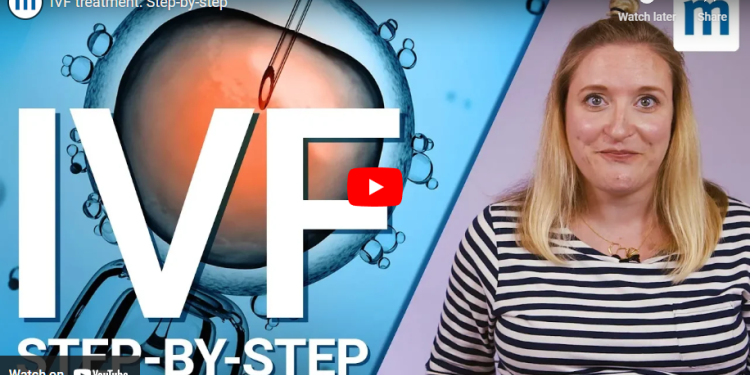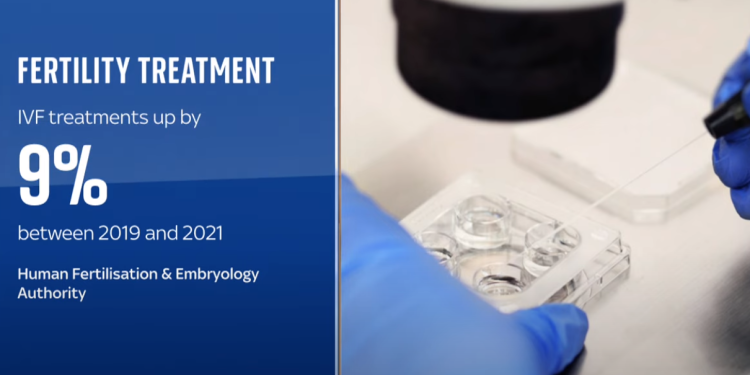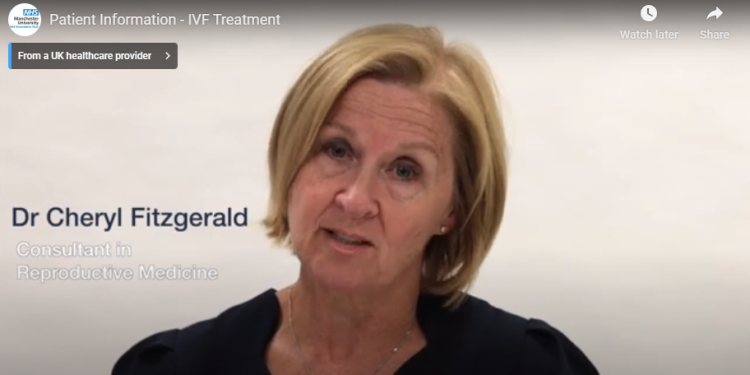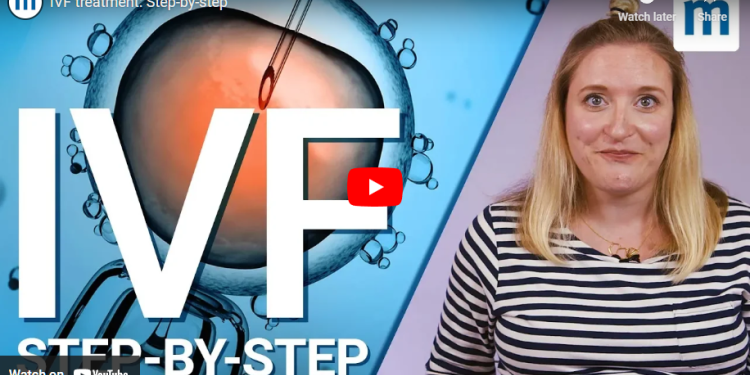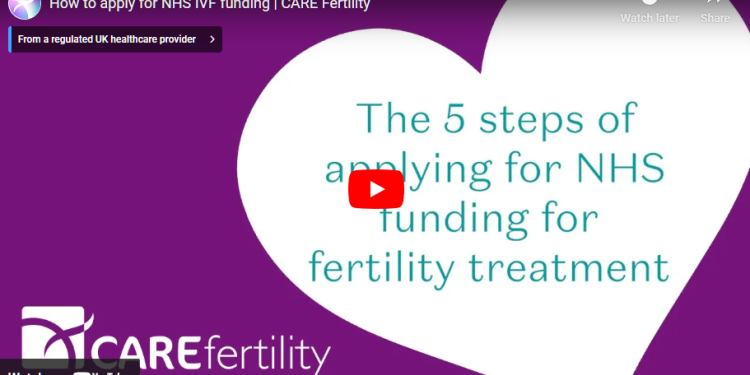Important Information On Using This Service
- Ergsy carefully checks the information in the videos we provide here.
- Videos shown by YouTube after a video has completed have NOT been reviewed by ERGSY.
- To view, click the arrow in the center of the video.
Using Subtitles and Closed Captions
- Most of the videos you find here will have subtitles and/or closed captions available.
- You may need to turn these on and choose your preferred language.
Turn Captions On or Off
- Go to the video you'd like to watch.
- If closed captions (CC) are available, settings will be visible on the bottom right of the video player.
- To turn on captions, click settings.
- To turn off captions, click settings again.
Find A Professional
Videos from Ergsy search
A report from Sky News on fertility treatments
More people than ever before are accessing fertility treatment in the UK, according to new figures, but more people than ever before are also paying for it. The Human Fertilisation & Embryology Authority (HFEA) says there was a 9% increase in the number of IVF cycles between 2019 and 2021.
Fertility Treatments on the Up, but Not via the NHS
Increasing Demand for Fertility Treatments
In recent years, there has been a significant rise in the demand for fertility treatments across the United Kingdom. Couples and individuals facing challenges in conceiving are turning to a variety of assisted reproductive technologies (ART) to help them achieve their dreams of parenthood. Procedures such as in vitro fertilisation (IVF), intrauterine insemination (IUI), and egg freezing have become more popular and widely discussed.
Limited Access through the NHS
Despite the increasing demand, access to fertility treatments through the National Health Service (NHS) remains limited. Budget constraints and varying commissioning guidelines across NHS Clinical Commissioning Groups (CCGs) mean that access to treatments can be highly inconsistent. While some regions may offer one or more cycles of IVF, others might offer none. As a result, many couples are finding themselves compelled to explore private options.
The Private Sector’s Role
With inconsistent NHS provision, the private sector has seen a significant uptick in patients seeking fertility solutions. Private clinics often offer a wider range of treatments, shorter waiting times, and more personalised care, albeit at higher costs. The expense of private fertility treatments, however, can be a substantial burden, potentially costing thousands of pounds per cycle, and may not be accessible to everyone.
Financial and Emotional Considerations
Opting for private fertility treatments involves both financial and emotional considerations. While private care can offer hope and a potentially higher success rate, the financial strain can be overwhelming. Additionally, the emotional rollercoaster associated with fertility treatments can be tough. Prospective parents are advised to seek comprehensive support, both emotional and financial, when considering their options.
Future of Fertility Treatment Access
There is ongoing debate about how to improve access to fertility treatments in the UK. Increased funding for NHS fertility services, standardising care provision across CCGs, and potential policy reforms are areas under consideration. Until systemic changes are implemented, individuals facing fertility challenges will continue to navigate the complex landscape between NHS limitations and private alternatives.
Frequently Asked Questions
What are the common types of fertility treatments?
Common types of fertility treatments include In Vitro Fertilisation (IVF), Intrauterine Insemination (IUI), fertility medications, and surgery to correct structural problems in reproductive organs.
Why is there an increase in fertility treatments?
There has been an increase in fertility treatments due to delayed childbearing, advances in medical technology, and higher awareness of fertility issues.
Are fertility treatments covered by the NHS?
While some fertility treatments are available through the NHS, many people experience long waiting lists, and access can be limited based on certain eligibility criteria, driving many to seek private options.
What are the eligibility criteria for NHS-funded fertility treatments?
Eligibility for NHS-funded fertility treatments may depend on factors such as age, previous children, Body Mass Index (BMI), and length of time trying to conceive.
How much do private fertility treatments cost in the UK?
The cost for private fertility treatments can vary, with IVF treatments typically costing between £5,000 and £10,000 per cycle, plus additional fees for medications and other necessary procedures.
What is In Vitro Fertilisation (IVF)?
IVF is a procedure where eggs are collected from the ovaries and fertilised with sperm in a lab. The fertilised eggs are then transferred to the uterus with the hope of achieving pregnancy.
Can lifestyle changes improve fertility?
Yes, lifestyle changes such as maintaining a healthy weight, eating a balanced diet, reducing alcohol and caffeine intake, and avoiding smoking can improve fertility.
What is Intrauterine Insemination (IUI)?
IUI involves placing sperm directly into the uterus around the time of ovulation to facilitate fertilisation. It is less invasive and cheaper than IVF.
Are fertility treatments successful?
The success rates of fertility treatments vary depending on many factors including age, underlying health conditions, and the specific type of treatment used. IVF, for example, has varying success rates based on these factors.
What are the potential risks of fertility treatments?
Risks can include multiple pregnancies, ovarian hyperstimulation syndrome (OHSS), ectopic pregnancy, and emotional and financial stress.
Do men need fertility treatments too?
Yes, male infertility can be addressed with treatments such as surgical sperm retrieval, sperm washing and IUI, and Intracytoplasmic Sperm Injection (ICSI) during IVF.
How long is the wait for NHS-funded fertility treatments?
Waiting times can vary by region and circumstances. Some patients may wait several months or even years for NHS-funded fertility treatments due to high demand.
What financial support is available for private fertility treatments?
Some clinics offer payment plans, loans, or discount packages. Patients might also consider employer benefits or seek personal loans to cover costs.
How can I find a reputable fertility clinic?
Look for clinics registered with the Human Fertilisation and Embryology Authority (HFEA), check success rates, read reviews, and consider recommendations from healthcare professionals.
What emotional support is available during fertility treatment?
Many clinics offer counselling services, and support groups are available through charities and online communities. Emotional support is crucial given the potential stress and emotional strain of fertility treatments.
Useful Links
Have you found an error, or do you have a link or some information you would like to share? Please let us know using the form below.
- Ergsy carfully checks the information in the videos we provide here.
- Videos shown by Youtube after a video has completed, have NOT been reviewed by ERGSY.
- To view, click the arrow in centre of video.
- Most of the videos you find here will have subtitles and/or closed captions available.
- You may need to turn these on, and choose your preferred language.
- Go to the video you'd like to watch.
- If closed captions (CC) are available, settings will be visible on the bottom right of the video player.
- To turn on Captions, click settings .
- To turn off Captions, click settings again.
